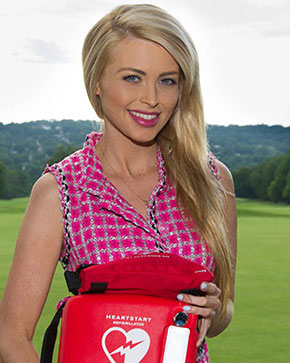
By Lindsay Davis
I recently shadowed Srihari S. Naidu, MD, FACC, director of the Hypertrophic Cardiomyopathy Program at the Westchester Medical Center Heart and Vascular Institute in New York. I was able to spend time there, visit patients with hypertrophic cardiomyopathy
(HCM) and meet the team that diligently works to ensure their care.
If you skimmed my bio, you may have wondered why a pageant queen has any interest or qualification to talk about HCM and these centers. Shouldn’t I be writing about world peace?
At 17 years old, I was diagnosed with HCM when I collapsed after dance practice. HCM is a genetic heart disease. It causes an abnormal thickening of the walls of the heart and reduces the amount of blood that can be pumped out to the body. It can cause
symptoms such as fainting, fatigue, shortness of breath and edema (swelling). It also can lead to a dangerous heart rhythm (arrhythmia) in some patients. But the disease often goes undetected. Sometimes a sudden cardiac arrest is the first sign of
the condition.
Standard treatment usually involves beta blockers, the implantation of a pacemaker or defibrillator in those who have a high risk for abnormal heart rhythms, and the recommendation to avoid strenuous physical activity.
My Experience
 I’ve had 16 years of regular use of many health care systems across the country. I have an insider patient perspective on the difference between the
traditional approach to treat my disease compared with the care at a comprehensive center for HCM.
I’ve had 16 years of regular use of many health care systems across the country. I have an insider patient perspective on the difference between the
traditional approach to treat my disease compared with the care at a comprehensive center for HCM.
At standard hospitals without recognized HCM programs, I experienced mistakes. For example, I was given nitroglycerine for chest pain. Nitroglycerine is dangerous in HCM because it dehydrates your heart and dilates the arteries, and then it increases how hard the heart squeezes. All these things also increase obstruction and drop the blood pressure suddenly. A patient with HCM may get profoundly dizzy or even pass
out if they take nitroglycerin.
HCM is considered a rare disease. Most cardiologists are inundated with other heart conditions that are more common. Most will see only a handful of HCM cases during their careers. How many of those do you think will look like yours? My disease alone
took 17 years, several hospitals, physicians, and misdiagnoses to identify.
The American College of Cardiology and American Heart Association have released a new guideline on the management of HCM. Educating general cardiologists about new research and treatments can help ensure that patients are diagnosed with HCM correctly
and early. I hope that as baseline knowledge of the condition increases among clinicians, fewer people will have my experience.
At the same time, litany is the basis of learning. Through handling a high volume of cases, specialized centers offer personalized care catered to the nuances of your disease and ensure a premium level of care.
A Day at a Specialized Center
As I walked through the door of the Westchester HCM Center, I instantly knew I was home. There was a family feel to the staff and their interaction with patients. I felt like I had stumbled on an exclusive
big hearts club made successful by a staff with even bigger hearts.
It was clear to me that everyone who worked with Dr. Naidu had immense knowledge of my condition. I could see why it would make any patient realize they're special, after they had felt neglected—perhaps inadvertently—by other health care systems.
Dr. Naidu took his time with each patient, making them laugh and feel at ease. The entire experience really made me feel like the team truly cared about you and getting you into your healthiest form.
An overarching theme I heard from the patients that day was that they had not been taught that HCM is a lifelong disease or how to manage it. Among other things, living well with HCM includes non-strenuous exercise routines and healthy eating to maintain
a proper weight.
Another rarely talked about aspect of the disease is the emotional and psychological effect on patients and their loved ones. It’s important to voice what you are feeling with your cardiologist. You should know that you’re not alone, and it’s
OK to ask for help. There are even cardiac psychologists who are skilled in helping patients develop strategies to cope with chronic diseases like HCM!
Get the Care You Deserve
HCM centers vary in services and experience. But they all have the core goal of facilitating HCM patients getting the expert care they deserve, either directly at their institution or through referrals to
specialists in HCM.
Research and treatment have come so far since the condition was first identified more than 60 years ago. Cardiologists outside HCM centers can play an important role in diagnosing a patient with HCM early. The release of the new guideline will hopefully
broaden the knowledge of understanding for this condition.
Still, patients may want to go to a specialized center for more complex decisions and care. If possible, combine your care from a local cardiologist with the care at a comprehensive HCM center—even if you need to travel for it.
As a patient with HCM, it’s important that you, together with your cardiologist and your HCM specialist, take charge of your disease and your health. After all, you have only one heart!
Lindsay Davis, a former Miss Ohio who was instrumental in the passage of “Lindsay’s Law”—a sudden cardiac arrest legislation as well as a CPR training mandate in several states—has written on living with hypertrophic cardiomyopathy and works to raise awareness of sudden cardiac arrest and other prevention strategies. She is also a patient advocate in policy reform for the American College of Cardiology at state and national levels.